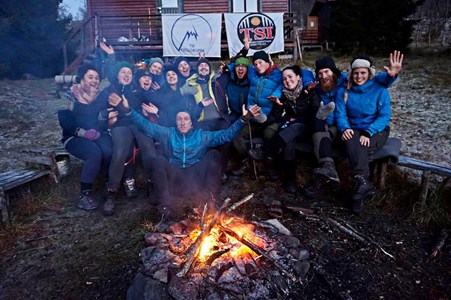Whilst working on my bachelor degree in marine biology at University of Québec in Rimouski (UQAR), I developed a great interest in Arctic sciences. I first found out about UArctic by a small publicity posted on a billboard in my university. As I visited their website, I realised I had found exactly what I was looking for: a mobility opportunity between universities which offer a lot of programs specialized in Arctic sciences. I did not hesitate a minute before I started filling up an application for the north2north program, and I had a lot of fun browsing around to decide where I would apply - those were some tough choices to make!
I had heard great feedback and recommendations on UiT The Arctic University of Norway, in Tromsø, and I loved the different courses they offered, which is why I went for this institution – and I do not regret it one bit! Tromsø is amazing in so many ways, the landscape is beautiful and the university’s community is very welcoming. I have had the chance to meet a lot of interesting, passionate people, and not only in my field of study. As UiT receives a lot of international students every year, the student community was very open and it was quite easy to make friends and find something to do on the weekends! Northern Norway is amazing for outdoor activities, and I’ll forever keep precious memories of weekend hikes and expeditions with great people from all over the world with all kinds of backgrounds and passions.

This exchange semester did come with its load of challenges. It was my first time facing immigration procedures, my first university courses entirely in English, my first master level courses, all of which I managed to tackle with lots of fun and success. On a personal level, this experience gave me the opportunity to make new friends from all over the world, and change my perspective on how I want to live my life. For example, I now hope that one day I’ll have the opportunity to live abroad for a longer period, ideally in an Arctic country. On a professional level, it is now clear that I want to undertake a scientific career in the Arctic, and this experience has also allowed to meet some potential future colleagues or collaborators. I am still in contact with some students from the master program I studied in last semester, but also with some scientists with whom I am currently organizing a field trip for my master’s project in Ny-Ålesund, Svalbard, this spring. I got a lot on plate for the next few months to come, but I couldn’t be more enthusiast since most of it revolves around Arctic sciences.
I did learn a lot about the Arctic marine system and its challenges, but two ideas emerge very clearly from the lectures and projects I participated in during my semester: the Arctic is still a mystery in many disciplines of environmental sciences, and it is an international territory for which quite a few nations must cooperate in order to study and preserve it. Through my lectures, I came to understand how important international cooperation is to the scientific community, especially in the face of global change in the Arctic. This realization brought me to think about how I can participate right now or in the future in this cooperation as the next generation of scientists, and I am excited to be part of that by getting involved in national or international organizations for polar scientists and students.
My only advice for potential students who are thinking about going abroad: do it! I have learned so much about myself, and I have either confirmed or completely changed my life and career goals, and I am eternally grateful for the memorable time I spent in Tromsø. You can never really know what is waiting for you, and chances are, we often underestimate how such an experience can be life changing. I know I never thought it would be such an adventure. So, go ahead, take the leap, and enjoy the “cool” ride!
Published in 2017.
